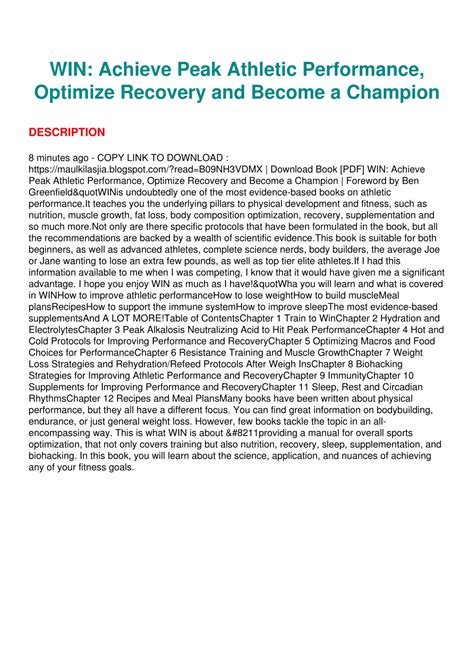How to optimize recovery for faster gains and peak physical performance?

The Unsung Hero: Why Recovery Matters More Than Your Workout
Many athletes and fitness enthusiasts meticulously plan their workouts, track reps, and push their limits, yet often overlook the most critical component for progress: recovery. Training breaks down muscle tissue and depletes energy stores; it’s during the recovery phase that your body repairs, rebuilds, and adapts, ultimately leading to stronger muscles, improved endurance, and enhanced overall performance. Neglecting recovery not only stalls your gains but also increases your risk of injury, burnout, and plateau.
Understanding the science behind recovery and implementing a strategic approach is the secret weapon for unlocking faster gains and sustaining peak physical performance. It’s not just about resting; it’s about actively facilitating your body’s repair processes.
Pillars of Optimal Recovery for Peak Performance
1. Quality Sleep: Your Ultimate Anabolic State
Sleep is arguably the most powerful recovery tool. During deep sleep cycles, your body releases growth hormone, which is vital for muscle repair and growth. Adequate sleep also regulates cortisol (stress hormone) levels and improves cognitive function, directly impacting your energy and focus for subsequent workouts. Aim for 7-9 hours of uninterrupted, quality sleep per night. Establish a consistent sleep schedule, create a dark and cool sleep environment, and avoid screens before bed.

2. Strategic Nutrition: Fueling Repair and Growth
What you eat and drink profoundly impacts your body’s ability to recover. Post-workout nutrition is critical for replenishing glycogen stores and providing the building blocks for muscle repair.
- Protein: Consume adequate protein (around 1.6-2.2g per kg of body weight) spread throughout the day, especially after workouts, to provide amino acids for muscle protein synthesis.
- Carbohydrates: Replenish glycogen stores with complex carbohydrates, particularly after intense or prolonged training sessions.
- Healthy Fats: Support hormone production and reduce inflammation with sources like avocados, nuts, seeds, and fatty fish.
- Hydration: Dehydration significantly impairs performance and recovery. Drink plenty of water throughout the day, increasing intake around workouts. Consider electrolytes if training intensely or in hot conditions.

3. Active Recovery and Mobility
While complete rest days are essential, active recovery can enhance blood flow to fatigued muscles, delivering nutrients and flushing out metabolic waste products without adding significant stress. Light activities like walking, cycling, swimming, or yoga can be highly beneficial. Incorporate stretching, foam rolling, and mobility work to improve range of motion, reduce muscle soreness, and prevent stiffness.
4. Stress Management and Mental Well-being
Physical stress from training, coupled with mental and emotional stress from daily life, can elevate cortisol levels, hindering recovery and promoting muscle breakdown. Integrating stress-reducing practices like meditation, deep breathing exercises, spending time in nature, or engaging in hobbies can significantly improve your recovery capacity. A calm mind supports a resilient body.

5. Strategic Supplementation (When Appropriate)
While whole foods should always be the foundation, certain supplements can complement a solid recovery strategy:
- Whey Protein: Fast-digesting protein source for post-workout.
- Creatine: Aids in ATP regeneration, improving strength and power, and potentially aiding recovery.
- Branched-Chain Amino Acids (BCAAs): May reduce muscle soreness and promote protein synthesis.
- Omega-3 Fatty Acids: Known for their anti-inflammatory properties.
- Magnesium: Supports muscle function and relaxation, and can aid sleep quality.
Always consult with a healthcare professional or registered dietitian before adding supplements to your regimen.

Listening to Your Body and Periodization
Recovery is not a one-size-fits-all approach. Pay attention to your body’s signals: persistent soreness, fatigue, irritability, poor sleep, or a drop in performance are all signs that you might be overtraining or under-recovering. Incorporate deload weeks or active recovery phases into your training program to allow for supercompensation and continued progress. Periodizing your training to include phases of higher intensity followed by periods of lower intensity can optimize adaptation and prevent burnout.

Conclusion
Optimizing recovery is not a passive act but an active and intentional part of your fitness journey. By prioritizing quality sleep, strategic nutrition, active recovery, stress management, and mindful supplementation, you empower your body to repair, adapt, and grow. Embrace recovery as diligently as you embrace your workouts, and you’ll unlock faster gains, minimize injury risk, and consistently achieve peak physical performance.









